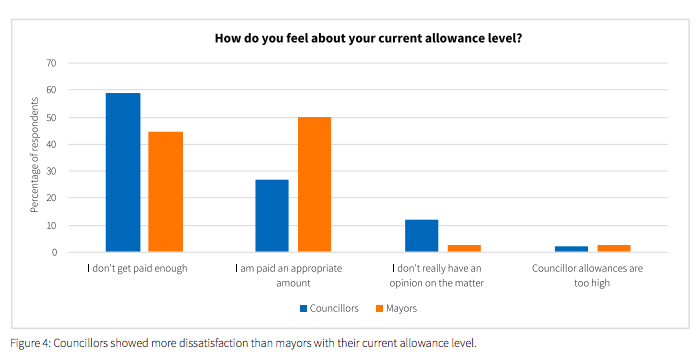
More than half of Victorian councillors don’t think they get paid enough, a survey reveals.

The findings are contained in a new report on councillor expenses and allowances released by Victoria’s Local Government Inspectorate.
The survey showed that while councillors are fairly happy with the resources and facilities provided to them, it’s a different story when it comes to allowances.
“While most councillors and mayors are receiving an allowance at or near the top of the relevant range, the Inspectorate’s survey revealed a high proportion of discontentment with the amount of the allowance,” Acting chief municipal inspector Dr John Lynch said.
Of the 179 councillors surveyed, 59 per cent said they didn’t get paid enough and less than a third said they were paid an appropriate amount.
Of 38 mayors, 44 per cent didn’t think they were paid enough, with only 50 per cent agreeing they were appropriately paid.

More than 35 per cent of mayors viewed their allowance as a form of salary, while councillors considered it as a way of covering their costs.
According to the survey, a third of mayors dedicate more than 40 hours a week to their role and about 70 per cent of councillors dedicate more than 16 hours a week.
Many said they had to compromise working hours and time with family to perform their public roles.
Depending on income and population, councils (apart from Melbourne and Geelong which have their own arrangements) can apply for allowances ranging from a maximum of $31,444 for councillors and up to $100,434 for Mayors.
According to the government’s 2018 policy statement, councillor allowances are designed not as a form of salary but a recognition of their contribution.
Policy compliance
The report also audited seven councils with regards to policy compliance and best practice around expenses.
It found that councils were not generally making expenses publicly available, apart from standard disclosures in annual reports.
“Greater transparency would be achieved by implementing a sector wide practice of regular public expense reporting via council websites,” it said.
The report says the inspectorate also investigated allegations that a councillor from a large shire council regularly claimed travel reimbursement for functions and training but went shopping instead.
“This illustrates that councillors may be wasting council resources by electing to attend conferences, events or seminars to obtain travel reimbursements,” the report said.
Dr Lynch said the new local government laws were less prescriptive about appropriate expenses for councillors, putting more of an onus on councils to do the right thing.
He says the report found “some deviations” in policy around expenses and allowances, including claims being submitted outside stipulated periods and incorrect claims forms being used.
Some risks such as a CEO’s corporate credit card being used for councillor expenses and claiming expenses by way of petty cash were also identified.
It also found “significant variation” in reporting on councillor expenses, largely due to differing interpretations of expense categories.
“While the audit did not reveal significant deviation from expected practices, it still showed there is room for improvement in the practices employed by councils,” the report said.
Comment below to have your say on this story.
If you have a news story or tip-off, get in touch at editorial@governmentnews.com.au.
Sign up to the Government News newsletter
If you worked as a Councillor in metro Melbourne for 20 to 30 hours a week, days, nights and weekends then why wouldn’t you be crying poor about a total salary of $26,000 p.a. including a 9.5% Super component?
The use of the term ‘allowance’ only leads the public to believe it is money that Councillors receive on top of a massive salary.
Unfortunately those of us who are in the role know better and until their is fair remuneration offered it will remain difficult to attract people with talent to take on the role as a representative.
Mike
You weren’t conscripted to the ‘job’- it was your conscious choice.
Could it be you are there in hope of a future public life at state or federal level?
Spot on Cliff